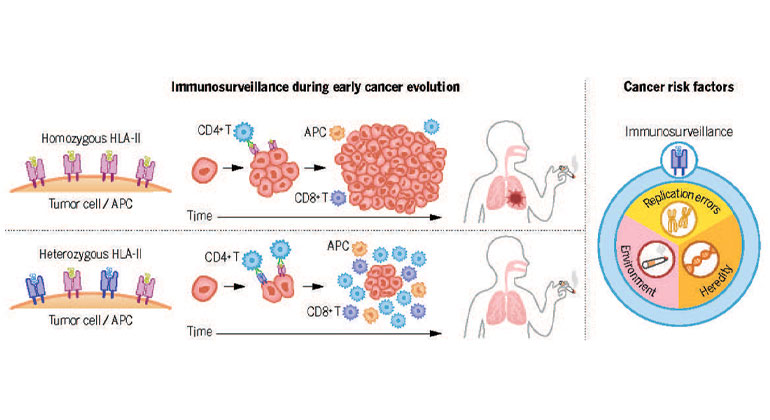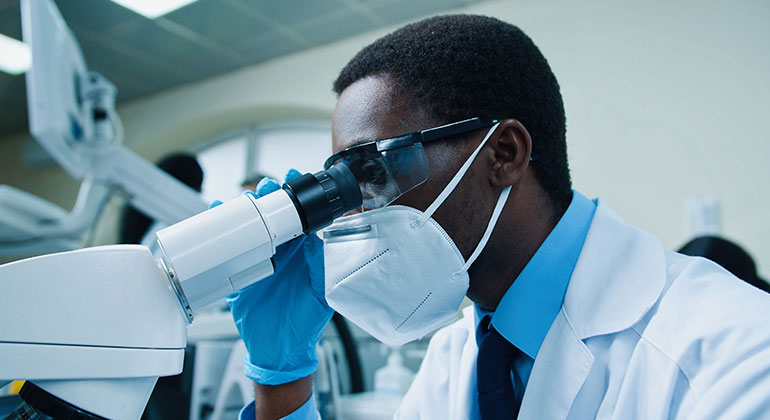Gene Variant May Provide Novel Therapy for Several Cancer Types
A novel gene variant found in human and animal tissue may be a promising treatment for cancer, including breast and brain cancer.
A novel gene variant found in human and animal tissue may be a promising treatment for cancer, including breast and brain cancer, according to scientists from the Icahn School of Medicine at Mount Sinai. The variant, called PTEN-long, may contribute to a cell’s healthy function and also suppress tumor cell development. This landmark study is published in the June 6, 2013 issue of the journal Science.
Ramon Parsons, MD, PhD, Professor and Chair of Oncological Sciences led the team that discovered a mutation in the tumor suppressor gene PTEN, which has subsequently been recognized as the second most common mutation in cancer, especially in breast, prostate, and brain cancers. PTEN encodes a 403 amino acid lipid phosphatase protein that is critical to cellular growth, proliferation, and survival. Genetic inactivation of PTEN causes tumor development.
In the current study, Dr. Parsons and his team analyzed human cells and discovered a PTEN variant that has an additional protein sequence and is 43 percent longer than normal PTEN. They called this new variant PTEN-Long. Like PTEN, the long form has the same enzymatic activity, but unlike PTEN, it is secreted by the cell and can enter other cells, indicating that the added protein sequence acts as a delivery system for the tumor suppressor gene.
“This study culminates more than a decade of research that began soon after we learned the therapeutic potential of PTEN and the PI3K pathway,” said Dr. Parsons. “We are excited about the potential of PTEN-Long as a therapy for multiple cancer types.”
Using human breast and brain tumor cells that lacked PTEN and PTEN-Long, the research team introduced and overexpressed PTEN-Long and PTEN into the cells. They found that, similar to PTEN, PTEN-Long decreased the signaling activity on the PI3K pathway, thus reducing cellular proliferation. They also found that PTEN-Long was reduced in breast tumor tissue compared to healthy breast tissue.
To test the therapeutic potential of PTEN-Long, Dr. Parsons and his team injected mice with tumor cells, then administered PTEN-Long or a control preparation to the mice. For one of their tumor models, after five days of treatment, the tumors disappeared completely. The authors conclude that PTEN-Long alters signaling on the PI3K pathway to inhibit tumor growth and that its ability to enter other cells is critical to this process. As insulin operates on the PI3K pathway as well, the research team also noticed a brief increase in glucose concentration in the PTEN-Long treated mice.
“These findings indicate that PTEN-Long may contribute to cell homeostasis and suppression of cancer,” said Dr. Parsons. “This gene variant has significant potential as a protein-based therapy to treat cancer, and may have implications in diseases such as diabetes.”
Next, Dr. Parsons plans to study the normal functions of PTEN-Long, how tumors become resistant to it, what happens when it is missing, and how it can be used as a tool for therapy.
To learn more about research at the Tisch Cancer Institute, visit http://icahn.mssm.edu/research/institutes/tisch-cancer-institute.
The work was funded by the NCI, The Octoberwoman Foundation, and the Avon Foundation.
Dr. Parsons is a named inventor of a pending patent filed by Columbia Technology Ventures related to the use of PTEN-Long for the treatment of cancer and may benefit financially from this patent.
About The Mount Sinai Medical Center
The Mount Sinai Medical Center encompasses both The Mount Sinai Hospital and the Icahn School of Medicine at Mount Sinai. Established in 1968, the Icahn School of Medicine at Mount Sinai is one of the leading medical schools in the United States. The Icahn School of Medicine is noted for innovation in education, biomedical research, clinical care delivery, and local and global community service. It has more than 3,400 faculty members in 32 departments and 14 research institutes, and ranks among the top 20 medical schools both in National Institutes of Health (NIH) funding and by U.S. News & World Report.
The Mount Sinai Hospital, founded in 1852, is a 1,171-bed tertiary- and quaternary-care teaching facility and one of the nation’s oldest, largest and most-respected voluntary hospitals. In 2012, U.S. News & World Report ranked The Mount Sinai Hospital 14th on its elite Honor Roll of the nation’s top hospitals based on reputation, safety, and other patient-care factors. Mount Sinai is one of just 12 integrated academic medical centers whose medical school ranks among the top 20 in NIH funding and by U.S. News & World Report and whose hospital is on the U.S. News & World Report Honor Roll. Nearly 60,000 people were treated at Mount Sinai as inpatients last year, and approximately 560,000 outpatient visits took place.
For more information, visit http://www.mountsinai.org.
Find Mount Sinai on:
Facebook: http://www.facebook.com/mountsinainyc
Twitter @mountsinainyc
YouTube: http://www.youtube.com/mountsinainy
# # #
About the Mount Sinai Health System
Mount Sinai Health System is one of the largest academic medical systems in the New York metro area, with more than 43,000 employees working across eight hospitals, over 400 outpatient practices, nearly 300 labs, a school of nursing, and a leading school of medicine and graduate education. Mount Sinai advances health for all people, everywhere, by taking on the most complex health care challenges of our time — discovering and applying new scientific learning and knowledge; developing safer, more effective treatments; educating the next generation of medical leaders and innovators; and supporting local communities by delivering high-quality care to all who need it.
Through the integration of its hospitals, labs, and schools, Mount Sinai offers comprehensive health care solutions from birth through geriatrics, leveraging innovative approaches such as artificial intelligence and informatics while keeping patients’ medical and emotional needs at the center of all treatment. The Health System includes approximately 7,300 primary and specialty care physicians; 13 joint-venture outpatient surgery centers throughout the five boroughs of New York City, Westchester, Long Island, and Florida; and more than 30 affiliated community health centers. We are consistently ranked by U.S. News & World Report's Best Hospitals, receiving high "Honor Roll" status, and are highly ranked: No. 1 in Geriatrics and top 20 in Cardiology/Heart Surgery, Diabetes/Endocrinology, Gastroenterology/GI Surgery, Neurology/Neurosurgery, Orthopedics, Pulmonology/Lung Surgery, Rehabilitation, and Urology. New York Eye and Ear Infirmary of Mount Sinai is ranked No. 12 in Ophthalmology. U.S. News & World Report’s “Best Children’s Hospitals” ranks Mount Sinai Kravis Children's Hospital among the country’s best in several pediatric specialties.
For more information, visit https://www.mountsinai.org or find Mount Sinai on Facebook, Twitter and YouTube.

Study Reveals New Insights Into Immune System Role in Lung Cancer Risk
Feb 22, 2024 View All Press ReleasesMount Sinai’s Staten Island Cancer Center Moves to New Site
Nov 09, 2023 View All Press Releases
Scientists Create Most Powerful, Accurate Tool Yet to Research Deadliest Blood Cancer
Apr 18, 2023 View All Press Releases
Researchers Find Treatment Options for Patients Whose Blood Cancer Relapses After CAR-T
Nov 04, 2022 View All Press Releases
Study Identifies New Gene That Drives Colon Cancer
Oct 14, 2022 View All Press Releases
